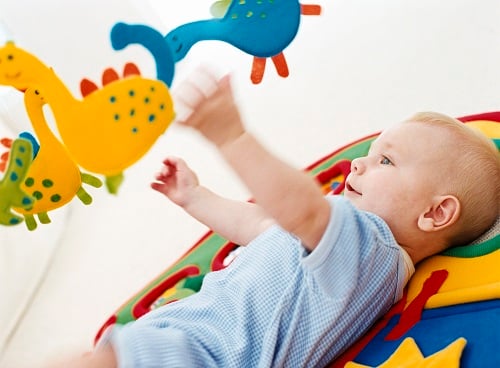Baby teething
Teething
Teething is when teeth first emerge from your baby’s gums. It is also known as cutting teeth. Most babies start the teething process between the ages of 4 and 7 months. Early developers may start sprouting teeth from 3 months old and some late developer’s don’t start teething until one year old. The first baby teeth usually are the bottom front teeth followed by the front upper teeth. Most toddlers complete teething and have a full set of teeth by around the age of 3. These teeth usually last until age 6 when adult teeth start to emerge.
Baby teething is often named as the cause of a wide variety of baby health-related problems. Yes, teething can bring with it a whole bunch of issues but should not be the umbrella term for any health problem or mood swing in a baby or toddler. For example, teething does not cause fever, diarrhoea, colds, coughs, ear infections or nappy rash. Teething may be accompanied by the following symptoms:
• Excessive biting
• Drooling more than usual
• Lots of sucking of thumbs and dummies
• Irritability
• Loss of appetite
There is not much you can do to accelerate the teething process but you can help your baby be as comfortable as possible during teething. Giving your baby something to chew on, like a cold washcloth from the refrigerator, may ease the teething discomfort that your bub is feeling. Bedtime is often the worst period in terms of discomfort that comes from teething. If your baby is really irritated then consider giving him/her some baby Panadol (always check with your doctor before you medicate your baby).
You may suffer many sleepless nights while your baby is teething, but when he/she smiles that huge ear-to-ear grin and says “cheese!” it will all be worthwhile. For remembering special baby milestones, Huggies has a great baby teething chart where you can record when each tooth popped through and any of your “teething memories”.
Baby teeth care
Generally, you should start taking care of your baby’s teeth as soon as the teething process has started and the first tooth emerges. This should be done with a very soft toothbrush and toothpaste that doesn’t have added fluoride (this kind of toothpaste is easier and safer for your baby to swallow). There are a wide variety of differing opinions regarding whether fluoride is beneficial or harmful. Huggies has a few of these different views in their water and fluoride section so you can make an educated decision as to whether you want to supplement your child’s diet with extra fluoride.
There are often more questions than answers regarding baby teeth care and in particular concerning teething. Questions like “How should I clean their teeth or gums?” and “Are there any hints on how to make the experience stress free?” are both answered by our Huggies teeth care experts.
At around one year old you should take your baby to the dentist, just to check that their teeth are developing ok and on schedule
Preventing tooth decay
Teething brings with it a whole heap of new issues and problems, chief among them is tooth decay. Now that your little one has started to get teeth, you have to worry about keeping them in top shape and preventing tooth decay. Unfortunately, many of your bub’s favourite foods might cause their teeth to get cavities. Huggies has created a great resource on preventing tooth decay where you can find snacks that are gentle on your little one’s teeth.
Some kids seem to have perfect teeth with no cavities, while others may spend countless hours in the dentist’s chair for cavities. For those kids with a lot of dental problems, Huggies has collected some great tooth tips including how to make food that is healthy for teeth seem more attractive to your little one.
The information published herein is intended and strictly only for informational, educational, purposes and the same shall not be misconstrued as medical advice. If you are worried about your own health, or your child’s well being, seek immediate medical advice. You should never delay seeking medical advice, disregard medical advice, or discontinue medical treatment because of information on this website. Kimberly-Clark and/ or its subsidiaries assumes no liability for the interpretation and/or use of the information contained in this article. Further, while due care and caution has been taken to ensure that the content here is free from mistakes or omissions, Kimberly-Clark and/ or its subsidiaries makes no claims, promises or guarantees about the accuracy, completeness or adequacy of the information here, and to the extent permitted by law, Kimberly-Clark and/ or its subsidiaries do not accept any liability or responsibility for claims, errors or omissions.Last Published* April, 2023
*Please note that the published date may not be the same as the date that the content was created and that information above may have changed since.




